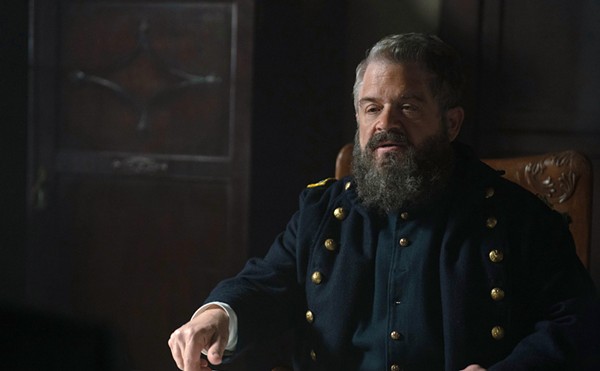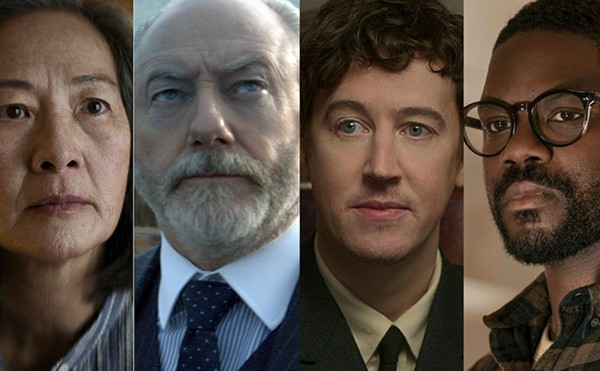| Edward Norton on the set of The Painted Veil. |
Edward Norton has a Yale education and impeccable manners, but he’s also that racist skinhead in American History X who cracked a man’s skull open on a street curb. Persuasively.
Norton always looks strongest when he’s tapping some hidden seam of sadism. Fight Club. Primal Fear. Even playing it for laughs in The Italian Job, Norton gives off scary. “I am Jack’s raging bile duct,” his conflicted character said in Fight Club. Who could argue? By age 30 he’d already scored two Oscar nominations for playing killers in Primal Fear and American History X. When an actor of that ferocity takes on the role of a man in love, it’s a magnificent struggle to behold.
In John Curran’s new film, The Painted Veil, Norton plays an English doctor dragging his unfaithful new wife (Naomi Watts) through 1920s China. He’s not a killer, but he understands how to punish.
“American History X, Fight Club, Down In The Valley, 25th Hour, even Keeping The Faith or `The People vs.` Larry Flynt, those are films totally rooted in my generation’s experience,” Norton says. “This one is not about that, clearly. It’s taking you away from the now. And yet when period movies are good, they still resonate.
“My character is one of those guys whose intentions are good, but he’s not paying enough attention or giving enough respect to the particulars of the people he’s trying to help.
“He’s a guy who is often right,” Norton says reflectively, “but he has a kind of certitude that’s alienating to people.”
As he speaks, it’s less and less clear whether he’s describing his character or himself. And that’s exactly his point.
“There’s also that very male thing I relate to,” he muses, “being hurt by a woman and responding with punishment. We don’t tend to go to our pillows and cry like the girls. We get mad. We take it out on them. We turn love into hate very quickly.
“There were times when I’d be talking to Naomi and John and I’d find myself, much more than I often do with a part, referencing my own experiences.”
In conversation, Norton displays the self-awareness that’s at the heart of his screen appeal. Even as his characters commit cruel acts, you get the sense that he’s thinking them through. Norton recalls reading Ron Nyswaner’s script and wondering, “Am I that way? Have I done that? Do I do that? Could I do that? Could I forgive?’“
It’s no wonder that the Shanghai Film Festival treated Norton to a retrospective called The Search For the Spiritual Center in the New Youth Generation. Norton laughs.
“I cut it out of the program and taped it on my fridge. I was like, “I don’t know if you know, but my films are the search for the spiritual center in the new youth generation.’ It was classic, man. You can’t beat that.”
Norton tends to shun the ego plantations of celebrity life, although he has squired Courtney Love, Drew Barrymore and Salma Hayek around, and they’re hardly wallflowers. But it’s the odder little moments of fame that tickle him.
“I went to a Radiohead concert in Amsterdam in August,” he says, “and I was standing there when these two Dutch guys, who were shockingly tall to me, slid over and stood there for a second. Then one of them turned and went, ‘It’s nice to see you out, sir.’”
The insider lingo from Fight Club cracked him up.
“I just started laughing. In a weird way, I like that better than people coming up and saying, ‘Can I have your autograph?’”
He and director David Fincher have gotten used to Fight Club’s iconic status, and he likes that fans are cool about it.
“People send us their divinity-school PhD theses about the film, you know? Fincher flips them to me or I flip them to Fincher. You realize that it’s gone way beyond you. It’s become this thing people are having a relationship with.” As for Norton’s take on the film, he says he and Fincher have a theory that Fight Club is a remake of The Graduate.
“The Graduate is about a guy who’s expected to engage in the adult world and feels alienated from that,” he begins, warming to the idea. “He’s given the opportunity to hook up with the girl who’s his natural opposite, and instead he chooses the gesture that feels like the middle finger to the establishment. He chooses literally to fuck his parents’ generation. He chooses the nihilism of Mrs. Robinson.
“In many ways, that’s like Tyler Durden `the Brad Pitt role`. Both of those films are about going through the sexiness of the negative choice only to come out realizing, ‘That’s not the person I’m looking to be.’ It’s interesting to me.”
Norton’s divided character in that film is the key to his work. Further, it distilled the mood of the era.
“I remember Fincher saying, ‘If we don’t get this movie out by the end of ’99 we might as well not do it,’” Norton recalls. “He had this sense that it was millennial.”
And it was 1999 that was the best year for American movies since the ’70s, says Norton. He rushes through the list:
“It was Fight Club, it was Being John Malkovich, it was Magnolia, it was Three Kings, it was Election, it was The Matrix. I had a very distinct feeling that year. Not to sound snotty, but I felt like we owned the zeitgeist. It was like we landed. There was this sensibility splattered all over these very unique, very personal films.
“I remember reading something that the screenwriter William Goldman wrote that year saying, ‘Nothing today touches this or that.’ And I remember thinking, ‘Wake up and smell the fucking coffee, man.’ I was ready to stack ’99 against any year anybody wanted to pick between ’65 and ’75.
“It was magnificent.”
















